Books |
Books
Travel books which I had pleasure to read. I skipped those Polish ones which haven’t been translated into English. First of all - inspiration.
In order when I reached for the book, starting from the latest one:
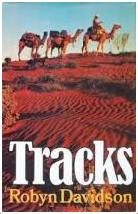 Title: Tracks
Title: Tracks
Writer: Robyn Davidson
Publication year: 1980
Type: Reportage from the expedition
In the '70s Alice Springs was the end of the world, a place of lawlessness and drunkenness, racism, prejudice and stereotypes. For several years the author lived in that world until she managed learned to work with camels. When the mission has been reached, she moved to fulfill her dream - walk with the animals to the Indian Ocean. The incredible expedition, struggle against bed luck, loneliness, the desert, and finally with the news media. I do not know whether I would have the courage to go into the desert without good maps, GPS, satellite phone, to rely only on myself. I admire her. The same title movie was made based on that book.
 Title: The Dig Tree: The story of Burke & Wills
Title: The Dig Tree: The story of Burke & Wills
Writer: Sarah Murgatroyd
Publication year: 2002
Type: Historical documentation
This book is about the most expensive, controversial and incredible expedition in Australian history. You'll find answers or hypotheses to questions like why Burke, a person without expeditionary experience, who even could get lost in his own backyard - was appointed as a leader of the expedition. Why they were carrying several tons of unnecessary equipment, such as oak dining table set or Chinese dong; Why they didn’t get by boat to the farthest possible place; what stopped a team just 5 km before the sea; how unlucky you have to be to get back to the camp after several months of life’s survival struggle just to found that the camp was left… the same day in the morning (buried letter under The Dig Tree). Exhausted Burke & Wills made a few more mistakes, for which unfortunately, this time they paid the highest price – together with already five dead other expedition members. One person was rescued by Aborigines, King returned to Melbourne alive. It’s extremely interesting story.
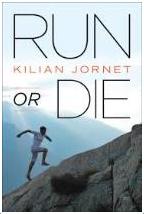 Title: Run or die
Title: Run or die
Writer: Kilian Jornet
Publication year: 2012
Type: Reportage
The book is about a dream and great strength of will, it lets to believe that we can make every goal that we determine to achieve. Although this book is written by a professional cross country runner, it extents to the psychological side of the endurance. I admire Kilian for his stubbornness and a huge amount of work, it proves by example that his victory wasn’t by chance. But the most important thing for me is the way how Kilian understand the victory, and why you do not have to be the first on the finish line to win.
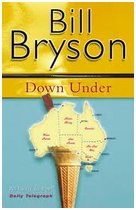 Title: Down Under
Title: Down Under
Writer: Bill Bryson
Publication year: 2000
Type: Reportage from the trip
I love Bryson’s comments, he sees things that others don’t. He describes Australia in a very interesting, different, funny, and honest way. What I like the most is the fact that he is impressed and enjoys simple things, events or situations. I laugh. learned something new, I looked at familiar things from a different perspective - a good complement to the image of Australia.
 Title: Extreme South
Title: Extreme South
Writer: James Castrission
Publication year: 2012
Type: Reportage from the expedition
When I first met James and his adventure partner Justin Jones, I thought they were another Australians who believe in luck and that the trips somehow happen. They were a bit overweighed, very relaxed, and easy-going – not like professionals. However, I was very wrong. James describes a 4-year preparation in details, all the problems of logistics, financial, technical, training, nutrition, mental, etc. It was a very well planned strategy. The boys knew what they were doing - and yet Antarctica made their lives harder then expected. There were crises, doubts and breakdowns. Despite the misfortunes they won over themselves through their own stubbornness, ambition and a strong mentality. They were the first people in the world (along with Norwegian Alex Gamme) who walked from the edge of Antarctica, reached the South Pole, and back to the starting point without any physical support. I really like James honesty who admits some thoughts, which under normal circumstances would be a bit embarrassing. But in his case it can be understand. Full respect.
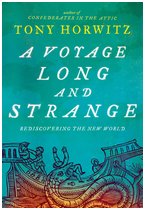 Title: A Voyage Long and Strange. Rediscovering the New World.
Title: A Voyage Long and Strange. Rediscovering the New World.
Writer: Tony Horwitz
Publication year: 2008
Type: Reportage from the expedition with historical documentation
I really like Horwitz style of writing. Looking at the issue from different perspectives. It gives you a lot to think about, you can see a bit of value even in the worst bastards. He doesn't judge too quickly, provides analysis and reflects on the motives. Book is saying the conquest of America story - from the Vikings, Columbus, the Spanish conquest, the French settlers, and finally the English pilgrims. Author fights between the myths and the documented events. The sad thing, however, is not that Americans don’t know their own history, but the fact that they totally do not care about it.
 Title: 1788. The Brutal truth of the First Fleet
Title: 1788. The Brutal truth of the First Fleet
Writer: David Hill
Publication year: 2008
Type: Historical documentation
The book describes the reasons, preparation, travel and initial years of the First Fleet, which in 1788 arrived in Sydney. This is an incredible story, interesting, scary, brutal. I can not understand how it happened that just 10 generations ago here was a total wilderness, and today Australia is one of the world leaders in many fields. And who created this prosperity? - society with 160.000 prisoners, which the UK wanted to get rid off once for good.
 Title: The Fatal Shore. A History of the Transportation of Convicts to Australia, 1787-1868
Title: The Fatal Shore. A History of the Transportation of Convicts to Australia, 1787-1868
Writer: Robert Hughes
Publication year: 1987
Type: Historical documentation
This is not a pure travel book, but it allows you to look at Australia from another perspective. From the dark, horrific, unjust, slave side. The life of convicts sent to Australia was not easy, sometimes even so cruel that it did not surprise that they preferred to be hang then keep going with this fate. Of course, not everyone had so bad, some had a luck and end up pretty well. This book is one big document, detailed, meticulous, facts - written without emotion in old style English. Now I look different at Sydney - on the buildings built by the prisoners, on the coast which was first landed over 200 years ago, on the old frozen road leading through the Blue Mountains etc. Fantastic documented tales of escapes, a few good governors, favorable fortune of strange coincidences. If you are interested in the history of Australia, it’s a book worth recommending.
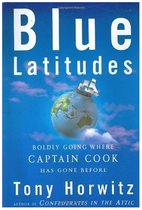 Title: Blue Latitudes (Into the Blue). Boldly Going Where Captain Cook Has Gone Before
Title: Blue Latitudes (Into the Blue). Boldly Going Where Captain Cook Has Gone Before
Writer: Tony Horwitz
Publication year: 2002
Type: Reportage from the expedition with historical documentation
After reading this fascinating book I have no doubt - Captain James Cook was the greatest traveller and explorer of the world. Born as a farmer's son in eighteenth century England, it was written to him to live and die in the farm. But he escaped from the village, and thanks to his hard work and talent in science, he had reached high position in the Royal Navy. Cook respected tribes of discovered islands, made friends with locals, traded the products, not robbed and killed for no reason. So I am not surprised that the author came up with an obsession on his point. Fortunately he managed to, as a good reporter, be objective and present the different points of view, even the negative, documenting and explaining their origin. Tony travelled through half of the Pacific asking questions and seeking the answers, mixing funny stories from his own trip with historical facts.
 Title: 50 Marathons 50 Days, The Secret To Super Endurance
Title: 50 Marathons 50 Days, The Secret To Super Endurance
Writer: Dean Karnazes
Publication year: 2008
Type: Reportage from the expedition
Actually this book is more about inspiration and good running advices then a reportage from Dean's endurance. It's true that he had done something very impressive - run 50 marathons in 50 consecutive days, every day in different state of the USA.
But when I was reading it, I could feel his passion for running and his inspirational way of passing it to the readers. He just was saying about the way of life, trying to convince us to choose the way we really wish to live. Running was just a tool. And what would you expect Dean was doing after his project was accomplished? It was very surprising to end up in Forrest Gump style...
 Title: Conquering the Impossible
Title: Conquering the Impossible
Writer: Mike Horn
English publication year: 2007
Type: Reportage from the expedition
After reading this book I found that nothing is impossible within the limits of human imagination. And that one is unlimited. Mike has accomplished something previously considered as impossible – he sailed and walked alone without motorized transportation along the Arctic Circle. Covering over 19,000 km, mostly of northern Canada and Siberia, it took him over two years, including two harsh Arctic winters with extreme low temperatures and lack of sunlight. He has gained my respect not only for the quality of his project, but mainly for his style. Writing the reportage Mike admires the surrounding nature, and all obstacles he passed like stubbornly maniac. He doesn't complain about the foot blisters, cold or difficult terrain. He is going to achieve his goals, learning how to survive, improving what he can. This book helped me to believe in my own abilities. Now I know that none of my plans are too hard, and that with a bit of luck I make my travel dreams come true. Because all depend on our will.
More about Mike Horn here
 Title: The longest walk. An Odyssey of the Human Spirit.
Title: The longest walk. An Odyssey of the Human Spirit.
Writer: George Meegan
Publication year: 1989
Type: Reportage from the expedition
A story about a dream and aspiration to achieve it. A young, inexperienced Englishman wants to take the longest walk in the world history. It begins in 1977 with a newly met girl on the southern tip of South America, starts marching in Alaska direction. His new friend is physically too weak to walk so much, however, is accompanying him in other way. After getting married, a Japanese woman returns home to give birth. Many months will pass on the road before George finds out whether he is a father. Just 30 years ago, but international phone calls were possible only from the biggest cities of Latin America. It was more than 30,000 km walk which ends after nearly seven years. The writing style isn’t impressive, but I felt the author's stubborn and sincerity. The last day of the journey was a reward or punishment?
 Title: Rule No. 5: No sex on the bus
Title: Rule No. 5: No sex on the bus
Writer:
Brian Thacker
Publication year: 2002
Type: Travel stories
This is a tour guide confession. Brian was leading European bus tours with groups of young fellows from Australia and New Zealand. For most Contiki Tours participants it was a trip just to have fun. Since I worked as a tour guide, this book came particularly close to me, I found many common aspects and problems with the " customers ".Brian is a typical Australian block, he likes to get drank and have fun, but has an open mind. I laughed aloud reading that book.
 Title: Unlikely Destinations - The Lonely Planet Story
Title: Unlikely Destinations - The Lonely Planet Story
Writer: Tony and Maureen Wheeler
Publication year: 2005
Type: Autobiography
The English couple, Tony and Maureen set off on a journey through Asia. They faced lack of information on where to eat cheap, where to find the budget hostel. When they finally got to Australia, they decided to write a guide - this was the first Lonely Planet. The book tells the story of successes and failures, the struggle, how to reconcile family life with time-consuming business. However, when the Lonely Planet has won the world’s recognition, Tony and Maureen did not stop on the profits. How they respect money, nature, local people, support the various projects etc that how they have gained my respect and admiration.
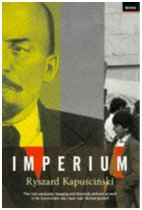 Title: Imperium (Imperium)
Title: Imperium (Imperium)
Writer: Ryszard Kapuscinski
Publication year: 1993
Type: Reportage
This time Kapuscinski is observing the way of Soviet Union Imperium collapse. He’s seeking traces of the former forced work camps, and in the eyes of older people he’s trying to identify the executioner or victim of the system.
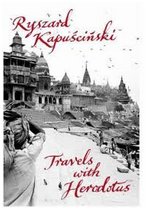 Title: Travels with Herodotus (Podroze z Herodotem)
Title: Travels with Herodotus (Podroze z Herodotem)
Writer: Ryszard Kapuscinski
Publication year: 2004
Type: Sort of Autobiography
Comparison of his travel experiences to the Herodotus, the ancient Greek historian. Herodotus traveled 2,500 years ago, although some aspects are always alive.
 Title: Shah of Shahs (Szachinszach)
Title: Shah of Shahs (Szachinszach)
Writer: Ryszard Kapuscinski
Publication year: 1982
Type: Reportage
Iran. Reportage from life of the last Iranian monarch just before the religious revolution in 1979. Mohammad Reza Pahlavi brought his country to destruction. Kapuscinski doesn’t speak directly what he think about him, just shows Shah steps, people and religious leaders reactions.
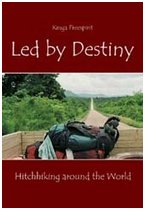 Title: Led by Destiny, Hitchhiking around the World (Prowadzil nas los)
Title: Led by Destiny, Hitchhiking around the World (Prowadzil nas los)
Writer:
Kinga Choszcz
Publication year: 2004
Type: Reportage
Five years hitchhiking around the world. Positive attitude, friendliness and openness of Kinga and her boyfriend Chopin. Written lightly, honestly, it's hard not to like Kinga and her surrounding world. A lot of inspiration.
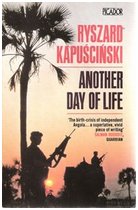 Title: Another Day of Life (Jeszcze dzien zycia)
Title: Another Day of Life (Jeszcze dzien zycia)
Writer: Ryszard Kapuscinski
Publication year: 1976
Type: Reportage
Angola 1975. The world is watching the beginning of another civil war on the Black Continent. But this time the real opponents here are Cuba and the Soviet Union against USA, Western Europe and South Africa. Once again, Kapuscinski delights of observation, comparison, different points of view, the logic.
 Title: The Emperor: Downfall of an Autocrat (Cesarz)
Title: The Emperor: Downfall of an Autocrat (Cesarz)
Writer: Ryszard Kapuscinski
Publication year: 1978
Type: Reportage
Ethiopia. The monarchy is weaker and weaker. Communists are taking power in 1974. Kapuscinski gives picture of Emperor Haile Selassie life from the original, backstage perspective. Contacting through emperor’s servants, who gave details of daily life in the royal walls.
 Title: The Shadow of the Sun (Heban)
Title: The Shadow of the Sun (Heban)
Writer:
Ryszard Kapuscinski
Publication year: 2001
Type: Reportage
Africa. A collection of interesting short stories about human (inhuman) relations in this mysterious continent. I admire the journalistic style of writing, the analysis, the interesting point of view and reference, the courage. He was the best at what he did – Kapuscinski wrote pretty good reports.
 Title: Wilderness Navigation
Title: Wilderness Navigation
Writer:
Bob and Mike Burns
Publication year of II edition: 2004
Type: Guide
Very well written guide about how to use maps, compass, altimeter and GPS. After reading it with understanding, it’s difficult to get lost in the field.
 Title: Alone Across Australia
Title: Alone Across Australia
Writer:
Jon Muir
Publication year: 2003
Type: Reportage from the expedition
Book tells about lonely traverse across Australia. The originality of Jon Muir expedition is not just about to cross the continent, but also the form of doing that - the trip was completely unsupported, without any resupplies on the way. He carried a rifle and a fishing rod, he gathered plants, cooked what he has found or hunted, he made salty water drinkable. As if this is not enough for you, he did not use any electronic navigation systems (GPS), carried only a compass and maps. On the walk from Port Augusta on the Southern Ocean coast to the village of Burketown in the Gulf of Carpentaria he took a dog with him (dog had been poisoned at the end of the trip). He pulled two wheel cart with all equipment, total of 122 kg weight. He was starting this adventure four times, as weather and equipment conditions have stopped his previous journeys. It wasn’t successful until the fourth attempt. He made this 2.500 km march within 128 days (four months).
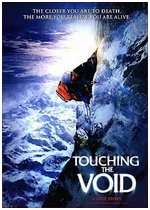 Title: Touching the Void
Title: Touching the Void
Writer:
Joe Simpson
Publication year: 1988
Type: Drama based on the true story
Two guys were climbing in Peruvian Andes. They reached the summit of over six-thousandth meters high Siula Grande, but during the descent Joe broke his leg. His partner Simon, did not leave him but helped to progress with the rope. However, once Joe hung in the air under the overhanging rock and could not climb up the rope with a broken leg. Due to terrible weather conditions Simon was not able to see either to hear him. He sat and held the rope for a long time, felt that holding the whole weight of the partner. A longer wait could mean death for both of them. Simon cut the rope. Joe fell straight into the glacier’s crevasse. He miraculously survived, but Simon was not aware of this. He was alone, without food or water, fought for life with a broken leg. A fantastic survival tale, psychology, struggle for life. Classic mountaineering story. Joe and Simon are still the friends.
 Title: The City of Joy (La cite de la joie)
Title: The City of Joy (La cite de la joie)
Writer: Dominique Lapierre
Publication year: 1985
Type: Fiction based on the true story of some people
A book about poverty and misery, inhuman relations, hard labor work, struggle and daily fight for some rice. The action takes place in the slums of Calcutta. Worth reading before leaving to India.
 Title: Lonely Planet Travel Guides
Title: Lonely Planet Travel Guides
Writer: many of them
Publication year: since 1973
Type: Guide
Guidebooks are very useful, I said it already in tips. I’m still thinking that Lonely Planet is the best and that is why it’s the most popular. A book guide does not have to mean that you can’t t get on unbeaten tracks.
 Title: The Alchemist
Title: The Alchemist
Writer: Paulo Coelho
Publication year: 1988
Type: Fiction
Our life should be in the way to accomplish The Own Legend, or other word “Chasing your Dreams”. After reading this book I had no doubt that I’ll be travelling, no matter that I can’t afford it. Attitude of corn seller the most stuck in my mind, he has always dreamed but never attempted to pursue their own dreams. He cheated himself and was selling corn for whole his life.